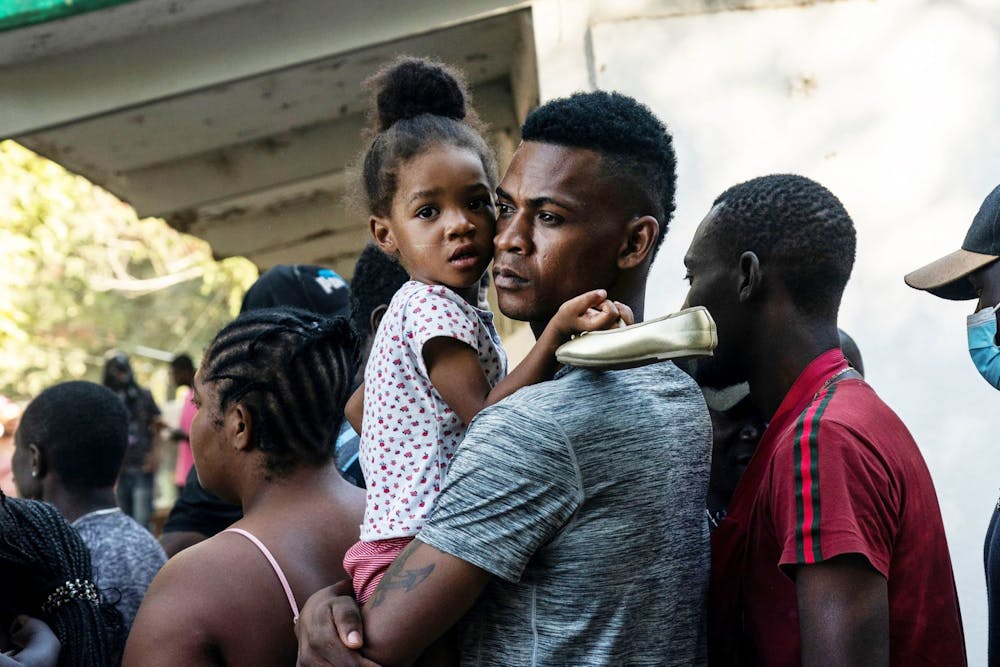PORT-AU-PRINCE, HAITI –– “People think that Haiti is a poor country, but that is not true,” Christian Charleston said. “Haiti is a rich country with beautiful people, but because of a corrupt government and natural disasters, Haiti can not flourish.”
Charleston spoke with The Echo from his home in Port-au-Prince, the capital of Haiti, during a phone interview on Nov. 10. He described the conditions that characterize the history of his homeland.
The Republic of Haiti, located in Caribbean waters, is currently home to nearly 10.2 million people. However, its roots must be explored to understand the current circumstances.
Haiti was occupied by France in the 17th century and the indigenous population was largely exterminated. Eventually, West Africans were imported for slave labor. In 1804, slaves defeated French troops in a revolt and proclaimed independence of Haiti.
This advancement came at a cost, though. France demanded monetary compensation for former slave owners, financially burdening the young country.
Two entwined barriers to Haitian development emerged — political and economic instability and natural devastation. These co-existent realities define the nation today.
“Few countries have struggled with development like Haiti,” a report from the Council on Foreign Relations said. “Since breaking free from French colonial rule over two centuries ago, the Caribbean state has weathered … chronic political instability, and devastating natural disasters.”
Haiti is the poorest country in the western hemisphere. According to The World Bank, nearly 60% of the population experiences poverty.
Additionally, 90% of Haitians are at risk of enduring natural devastation.
Due to poor economic standing, the country is not equipped with the necessary infrastructure to ensure safety for its citizens when natural disaster strikes.
Traveling back to his home in Camp Marie, Haiti, Polynice Waldimy spoke to The Echo through a phone interview on Nov. 10. As he drove through a nearby town, he called for action to address the failing infrastructure in the nation.
According to Waldimy, infrastructure was a concern before the three most recent disasters but has plummeted steadily since their happening.
On Jan. 12, 2010, an earthquake with a 7.2 temblor magnitude struck Haiti, killing an estimated 300,000 people. The event left over 1.5 million people unhoused.
Reconstruction would cost an estimated $8 billion, surpassing the country’s annual Gross Domestic Product (GDP). Without access to enough recovery funding, the earthquake exacerbated existing food insecurity, malnutrition and lack of shelter, according to the United Nations Children’s Fund (UNICEF).
On Oct. 4, 2016, Hurricane Matthew, Category 4, struck the southwestern region of Haiti.
According to Refugees International, the hurricane killed over 600 people and caused widespread damage to homes, public infrastructure and schools.
“Most of the homes in its path could not stand the force of its impact which blew away roofs and walls, destroying an estimated 90 percent of homes in the worst-hit areas,” Refugees International said.
On Aug. 14, 2021, another earthquake occurred in Haiti. With a 7.2 magnitude, over 2,000 people were killed and 30% of local homes were destroyed.
“Haiti faces a number of rapid-fire disasters and it does not have the economic resources nor the political responsibility required to recover,” a report from The Borgen Project said.
Aside from natural devastation, the country has experienced protracted political instability.
“The government is what makes me most sad about the situation in Haiti right now,” Charleston said. “The people in power work only for themselves, they only think about themselves, never the people of Haiti.”
This notion is heightened due to the recent assassination of President Jovenel Moïse in early July 2021.
“You have this situation where the institutions are not working, where the economy is stagnated ... the politics has been extremely volatile,” Robert Fatton said in an NPR article. “The current government has been challenged by the population. There have been massive accusations of corruption. So you name it, in terms of instability and institutional decay, you have it at the moment in Haiti.”
In response to this volatility, Waldimy said people conduct local protests and send letters to the elected officials that represent them.
Ritchamy Artis grew up in Fonds-Parisien, Haiti. He spoke to The Echo about the Haitian political struggle through a phone interview on Nov. 10.
“People are consistently protesting, but they are also working to build up an opposition party that might represent the people of Haiti in a better way,” Artis said.
Aside from these actions, many Haitians flee their country looking to break out of the compounding circumstances.
“Many of the migrants are fleeing natural disasters, poverty and political turmoil, and making a treacherous journey through Latin America to reach the border,” Bernd Debusmann Jr. said in a BBC article.
On Sept. 18, the Department of Homeland Security (DHS) announced a six-step strategy to address the increase of Haitian migrants. The approach called for a surge of border control agents to gain control of the area.
Photos of the treatment of Haitian migrants by U.S. agents emerged, sparking controversy in the U.S. and abroad.
“The US government showed a total disregard for the right to seek asylum when it sent agents on horseback with reins flailing to control and deter this largely Black migrant population,” said Alison Parker, U.S. managing director at Human Rights Watch. “This violent treatment of Haitians at the border is just the latest example of racially discriminatory, abusive, and illegal US border policies that are returning people to harm and humanitarian disaster.”
An estimated 2,000 migrants traveled back to Haiti on 17 expulsion flights, according to the DHS.
Charleston outlined the dual emotions his people experience when looking toward their future in Haiti.
“Any person who lives in Haiti is there because they do not have the option to move,” Charleston said. “If they did have the option, they would leave, but they will never stop loving their country. I am Haitian and love my country, but if I had the option, I would move.”
In tandem with this struggle, Charleston, Waldimy and Artis expressed hope for the future of Haiti, which is founded in the spirit of resilience among the people.
“Without resilience, Haiti simply would not exist,” Artis said.
Kristen White and Whitney Smith, who serve at Haitian Christian Mission, a local organization, believe the demeanor of the Haitian people should be highlighted.
“Although Haiti is seen as one of the most dire places, the Haitian culture continues to be characterized by laughter, hospitality and kindness,” Smith said.
Looking to the future, Charleston asks one thing of Americans concerning upcoming events in Haiti.
“All I ask is that people would pray for my country and for all that is to come,” Charleston said.
Another election will occur in the first months of 2022. The vote was originally planned to take place in 2019 but was postponed several times.
Citizens carry mixed feelings regarding the election.
“The people of Haiti are not extremely excited about the election because the opposing team is not very built up, it does not have a strong candidate either,” Artis said.
A new president, parliament and senate will be voted upon.





